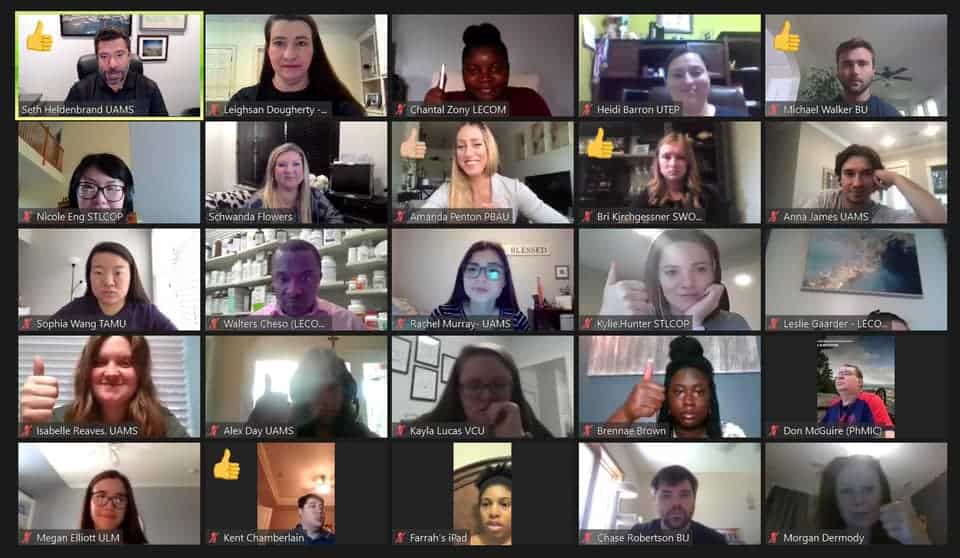Academy Finds Real Success in Virtual Form, Garners Sustaining Funding
| Converting an in-person program, meeting or event into a live, video streaming one has become common in 2020. Making it almost as successful as its original in-person version has been rare, although the UAMS College of Pharmacy has done it.
The NCPA Foundation-UAMS Pharmacy Ownership and Leadership Academy is a real-world example of the adaptability businesses like pharmacies have made to adjust to the COVID-19 global pandemic. The academy completely restructured itself by changing its schedule, moving its class sessions online and rethinking almost everything.
“It was much better than I expected it to be virtually,” academy student Kayla Olson said. “They’ve done a good job of making it the best it could be. They have made it as interactive as possible with the same information we would have gotten in person.” Olson is a third-year student at Southwest Oklahoma State University College of Pharmacy in Weatherford.
In only its second year, the academy also is getting noticed and winning significant financial support. Donors have contributed to an endowment to provide sustainable funding for the academy into the future. In addition to $100,000 from the college, the National Community Pharmacy Association Foundation earlier this year gave $250,000 to the endowment and First Financial Bank of El Dorado another $75,000. The goal is to raise $500,000.
The first academy offered in 2019 was a week-long series of sessions and workshops focused on the fundamentals of pharmacy ownership and leadership. Its curriculum was specifically designed to prepare students and equip them with the tools they need to be successful, independent pharmacy owners.
Instead, the 2020 academy spread its five online class sessions over several months, starting in August and concluding with its last class on Nov. 21.
Seth Heldenbrand, Pharm.D., the college’s associate dean for experiential education, organized and led the first and second academies with help from Schwanda Flowers, Pharm.D., adjunct associate professor. He said going virtual did offer one advantage, not having to cover expenses like meals meant it was possible to expand the number of participating students from 20 or 30 to 55.
Students were surveyed as to the best times for each online session, and the classes were recorded for later viewing online if an academy student couldn’t attend one when it streamed live.
“We tried to fit all the content we could into some long, extended Zoom classes,” Heldenbrand said. “We know how tiring that can be, so we tried to space it out.”
Topics like emotional intelligence, leadership, business planning and finance were relatively simple ones to adapt to virtual presentations. An important component of the 2019 academy, too, pharmacy owners took part in each session, making their own online presentations then giving almost equal time to an extended question-and-answer discussion.
Team building just wasn’t sustainable in the same way and networking was a challenge, Heldenbrand said. Students from California and Florida to Pennsylvania and Wyoming still signed up and nevertheless managed to find value in those areas of the academy.
“I didn’t expect to take new relationships away from the virtual setting,” Brianne Kirchgessner said. “When I heard it was going online, I expected it to be a seminar-based thing. I still was able to form connections. Down the road, when we can return to in-person events, I’m looking forward to seeing some of these people in person.”
Kirchgessner also is third-year student at Southwest Oklahoma State University College of Pharmacy.
Both Olson and Kirchgessner felt learning from pharmacy owners during the Q&A’s was especially rewarding for them. The owners shared their contact information and were very open to emailed questions from students after the class, too, Olson said.
Ownership had been a motivating factor for Olson in pursuing a career in pharmacy, but she had become unsure about it and had been considering other paths.
“Seeing pharmacy owners successful and happy in their businesses has revived that for me,” Olson said. “I had moved on to the fence a little bit. POLA has changed that for the better.”
Heldenbrand said he felt the academy succeeded despite the obstacles the pandemic created, but like almost everyone he’s looking forward to the day the pandemic is over and the academy can return to in-person education. He’s especially excited about what the growing endowment means for the future.
“That is going to generate money to train students across the nation and get them the skills they will need to purchase a pharmacy when they get out of school,” Heldenbrand said. “That’s what I am most proud of because it will enable the college to offer the academy in perpetuity long after I’m retired and gone.”
